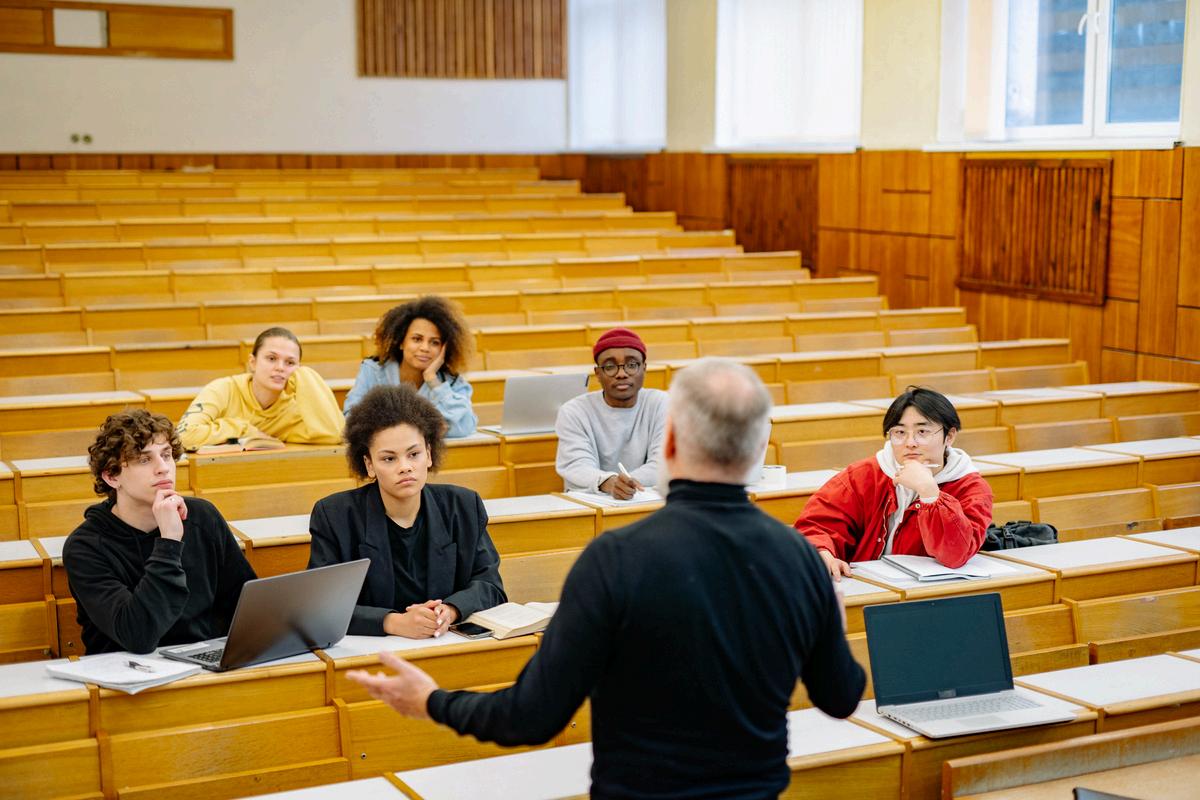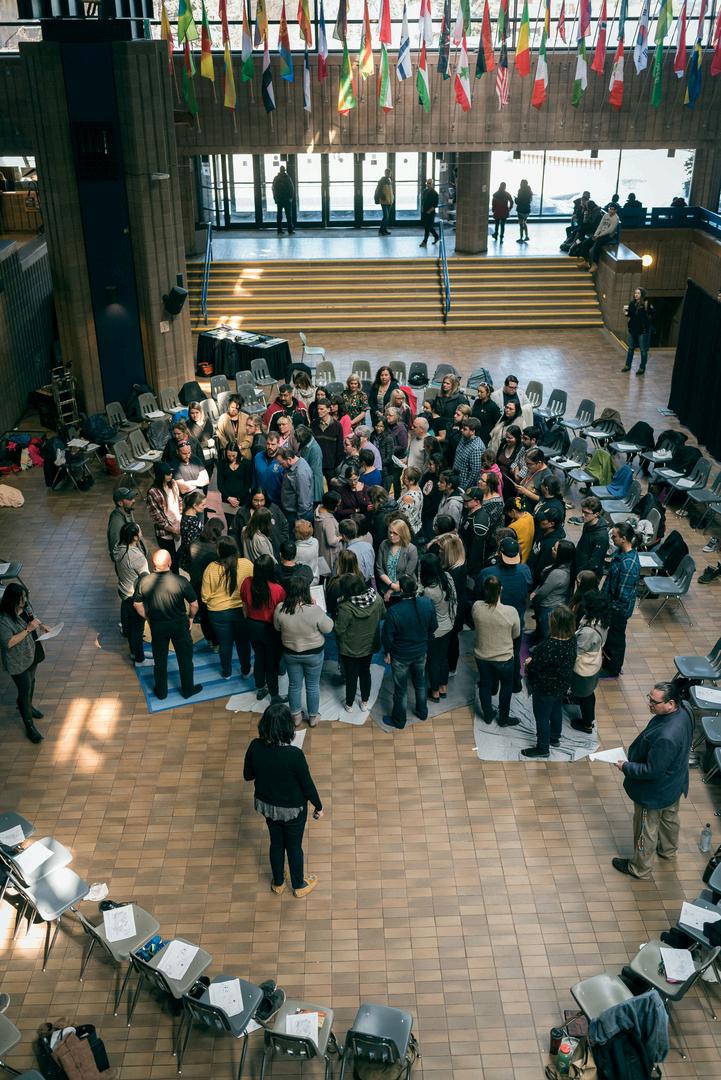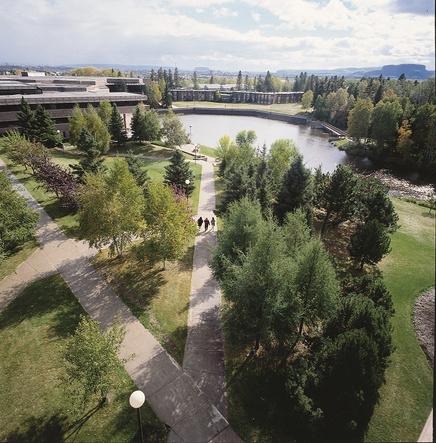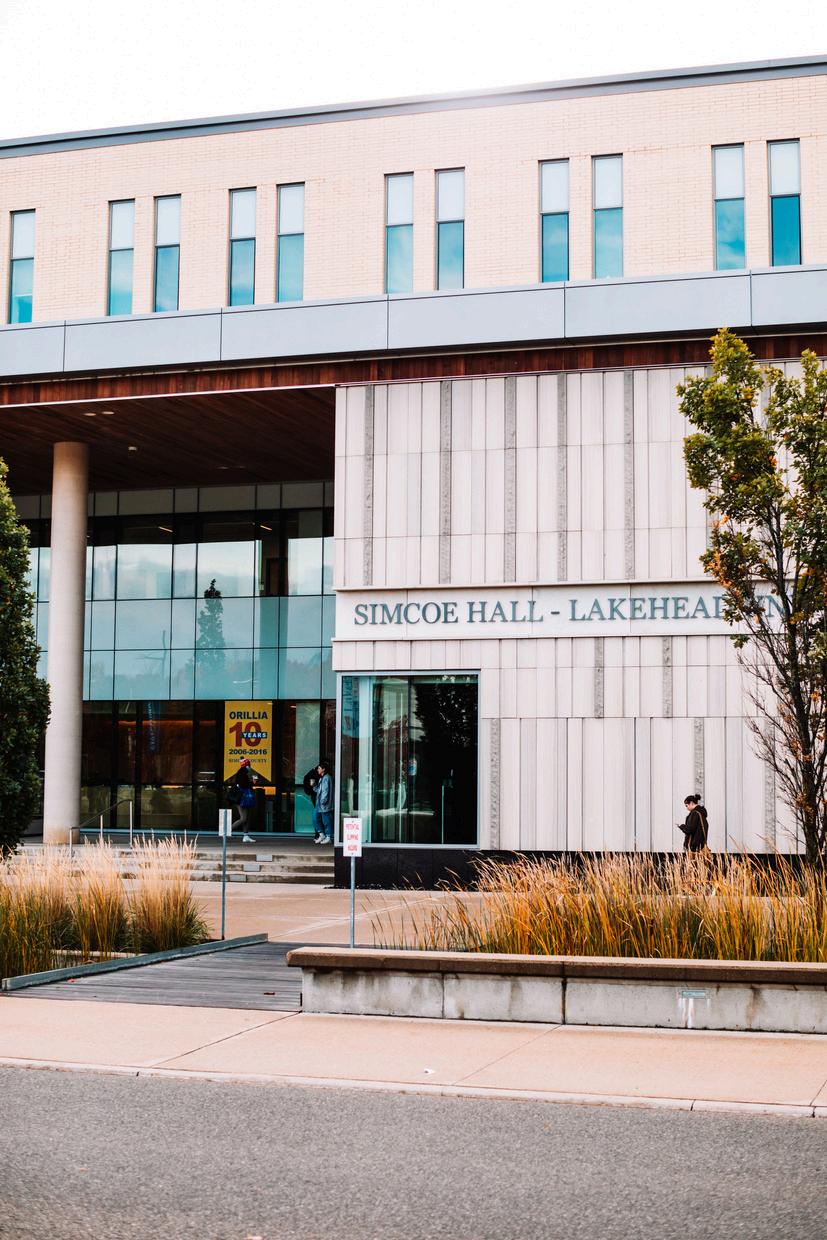








During the Spring and Summer of 2023, the Teaching Commons team undertook a process of reflection to identify and focus on the central mission, values, and services of the Teaching Commons. We strove to clearly articulate what those are and how they relate to our responsibilities and our support of the Academic Plan Our 2023 annual report is structured to reflect this work and our commitment to serving the Lakehead University community
As part of redefining our values and core services, we also undertook a refresh of both our website and newsletter formats, and we invite the community to provide feedback on both as we strive to continually improve and better serve the university
We are experienced, approachable, understanding collaborators in your teaching journey who provide practical guidance and support for wise and effective teaching and learning practices Within the Teaching Commons, we value the following:
Faculty First: Recognizing all instructors as unique teachers and learners
Inclusiveness: Promoting the creation of teaching and learning environments that embrace decolonization, diversity, and equity, where all feel welcomed, accepted, and respected
Dignity: Treating every individual with dignity and respect
Pragmatism: Providing practical, meaningful, and immediately relevant guidance and assistance
Collaboration: Developing relationships and working in partnership with instructors, staff, and others to carry out our mission of empowering excellence
Innovation: Embracing change and creative, forward-looking solutions to enhance teaching and learning practices
Research-informed Guidance: Using current research to support all aspects of teaching and learning
The following six pillars frame the Teaching Common’s key areas of focus and responsibility. The description of each pillar is followed by a summary of our activities over the past year.
OER Workshop - Introduction to OERs and Open Library
Circle Work: Ensuring You are Doing it in a Good Way
Accessibility Course Design and Facilitation Checklist
Learning Outcomes Guide
This pillar involves the creation and enhancement of the university's curriculum
The team supports course development and design, the clarification of learning outcomes, and aligning these outcomes with program goals and objectives. Our team collaborates with faculty members to ensure that courses of study are both meaningful and relevant – and incorporate effective and wise practices of pedagogy as well as Indigegogy
Learning Outcomes - Face-to-face and Online Activities Ideas
IQAP Support Documents related to Program Learning
Objectives, Program Learning Outcomes, Modes of Delivery
Private consultations in this area included many one-on-one single meetings, short-term working partnerships, and extended mentoring relationships during which we revised courses and assignments, considered essential requirements, and worked to incorporate innovative and effective pedagogical practices into all aspects of course design and teaching. Some big themes for the past year have focused primarily on accessibility; (inter)active learning; and effective use of generative AI in courses, assessment, and teaching/learning.
Teaching is a relational business, and the Teaching Commons staff spend a great deal of time working one on one with faculty and instructors in support of their teaching goals. Over 1300 such consultations were logged in the past year – these are in addition to the number of consultations specific to D2L.
WORKSHOPS OFFERED:
Engagement Tools for In-Person and Online Learning
Supporting Diverse Students I - Students with Accessibility Needs
Supporting Diverse Students II - International Students
Teaching Strategies for Teaching Writing I:
Assignment Planning and Making Writing Relevant
Teaching Strategies for Teaching Writing II: Assessment of Writing -- Rubrics and Grading Strategies
5 Quick and Easy Critical-Thinking In-Class Activities
TEMPLATES & RESOURCES DEVELOPED:
Instructional Strategies for Group Work
Group Work - Roles, Challenges and Solutions
CONSULTATION SERVICES:
Individual and small-group consultations as well as mentoring relationships of various durations allow us to help faculty engage issues of active learning, community development in the classroom (real or virtual), effective/alternate teaching and learning strategies, class management, conflict resolution, etc
Some big content themes for the past year were openeducational resources, multimedia supplementation, gamification, and effective use of generative AI in course design, content, and delivery as well as in assessment
This pillar focuses on providing pedagogical support to faculty members. Our team assists in instructional design, helps in the development of effective teaching strategies and techniques, and promotes innovative teaching practices. We offer support through workshops, training sessions, and/or individual consultations to enhance teaching skills and foster student engagement.
WORKSHOPS OFFERED AS PART OF THE 2023 SUMMER
TEACHING INSTITUTE:
Tips, Tools, and Techniques for Alternate Assessment
Group Work and Collaborative Assessment: Effective Strategies and Practices
Indigegogy: Adapting and Co-creating Assessments
Team-Based Learning I
Team-Based Learning II
Integrating Technology into Course Design: Building
Teaching with a Technology Toolbox
Exploring AI in Higher Education
Indigenous Perspectives and Social Assessment
Using Google for Collaboration, Presentation,
Communication, and Organization
Blended Learning and the Use of Videos
TEMPLATES & RESOURCES DEVELOPED:
IQAP CPR Support Documents related to Assessment of Teaching and Learning
Alternative & Authentic Assessments - Sample Assessment Methods
CONSULTATION SERVICES:
Here too, private consultations have proven essential as we have worked with instructors to consider their current assessment, sometimes exploring ways to reinvigorate existing assignments and other times helping them create new, innovative, and more engaging forms of assessment – often ones that consider the realities and possibilities of Generative AI in the process Our focus in these meetings is on helping instructors develop fresh, engaging, relevant, and authentic modes of assessment – both formative and summative. Some big themes for the past year were the effective and ethical use of generative AI in learning & assessment, more effective test-writing skills, alternate assessments, and rubrics
This pillar involves the development and implementation of effective assessment strategies to evaluate student learning outcomes. Our team provides support to faculty members as they design valid and reliable assessments, such as exams, projects, presentations, and a variety of alternate and authentic assessments. We also support the use of assessment results as feedback for continuous improvement.
WORKSHOPS OFFERED:
mycourselink/D2L Essential Skills Workshop
mycourselink/D2L Advanced Skills Workshop
mycourselink/D2L Quizzes Workshop
Student Engagement Using mycourselink/D2L Intelligent Agents
ChatGPT, AI, and the Future of Teaching (A Panel)
Student-Focused Chat GPT Panel
D2L Online Course Design Exemplar and How-to
mycourselink/D2L Orientation for Grad students
mycourselink/D2L Orientation for the Indigenous Access Program students
Teaching with Zoom (Indigenous Languages Department)
D2L Learning Object Repository (Student Affairs)
TEMPLATES & RESOURCES:
Teaching with Technology Database
Engagement Tools Collection
Accessible Course Design Checklist for mycourselink/D2L
Improvements to mycourselink 2023
Crosslinked Courses
mycourselink & Google Drive
Pinning Courses in mycourselink
Transfer Content Between Course Sites
CONSULTATION SERVICES:
Consultations in this area included numerous sessions focused on using educational technology to revise teaching, learning, assignments, and assessments to take best advantage of all the new possibilities and options – as well as strategies to co-opt/pre-empt (illicit) use of educational technology by students. Some big edtech themes for the past year were the effective use of generative AI, gamification, teaching with Zoom, finding and incorporating multimedia and OER for teaching, incorporating Google tools in instruction and active learning, and leveraging D2L’s tools to move beyond static course formats and offerings.
With the growing importance of technology in education, this pillar focuses on integrating educational technology into teaching and learning processes. Our team explores and recommends appropriate tools, platforms, and software applications to enhance the learning experience. We support faculty members in effectively utilizing technology for online learning, in-class learning, blended learning, and other instructional delivery modes
over 4200 credit & noncredit course sites
4000+ D2L support requests
48 new nonacademic sites
A core function of the Teaching Commons is to support mycourselink/D2L. Course sites in D2L are a key component for both instructors and students; there were over 4200 (2400 last year stat) course sites created this past year, an increase of 50% from the prior year.
With site creation comes the need for help, and over 4000 requests were made for assistance.
Besides faculty, many academic and administrative units make requests for and require assistance in the development of non-academic course sites. These D2L sites provide academic support, training initiatives, and professional development, and the Teaching Commons provides technical support for them as well.
Over the past year, there have been significant improvements to mycourselink, enhancing its functionality and user experience.
Real-time integration for mycourselink was implemented in March 2023. This automates the creation of online course sites and synchronizes enrolments in real time for an improved student and instructor experience
Gmail - In Spring 2023, the email tool in mycourselink was integrated with Lakehead's Gmail system. This means that messages composed in mycourselink are now delivered directly to the intended recipient's main Lakehead email address.
Setting extra time accommodations for quizzes through the classlist - Accommodations for students can now be set on the class list, which will automatically adjust quiz times for all quizzes on a course site. This was enabled in October 2023.
Synchronous quiz timing option allows instructors to set up a quiz where all learners begin and end the quiz at the same time. This was enabled in October 2023.
Quick Eval was enabled in mycourselink in November 2023 and offers a centralized location where instructors can view and evaluate ungraded submissions for discussions, assignments, and quizzes across all their courses.
This pillar addresses Indigenous Curriculum Support and Development.
In accordance with the release of the Truth and Reconciliation 94 Calls to Action in 2015 and Lakehead’s commitment to reconciliation, we recognize that education is a key part of reconciliation. Through workshops and one-on-one or group consultations, we support faculty and staff in relation to both Indigenous content and the Indigenization of the curriculum. We also work with faculty and staff to help create learning environments in which Indigenous students feel safe to contribute their input to help ensure the curriculum is in keeping with Indigenous worldviews
An important part of working towards decolonization, Indigenization, and reconciliation at Lakehead is working in community, within Lakehead University and in Thunder Bay (and, eventually, in Orillia). This involves participating in, sometimes leading, and often being a part of various events, activities, and workshops that support the work of the ICS It allows us time to hear what is happening in the community and to build a support network to enhance the work that Lakehead is doing. Indigenization is collaboration: this is an integral part of the work.
Pulling Together Workshops (for Student Affairs): Understanding Decolonization, Indigenization and Reconciliation, Who are Indigenous students?, Understanding Indigenous Worldview Values to Better Support Indigenous Students, Toward an Indigenized Student Services
Pulling Together Workshops for Academic Leaders (for Deans Council): Understanding Decolonization, Indigenization and Reconciliation, Understanding Indigenous Worldviews, Indigenization as Inclusion, Reconciliation and Decolonization - Where are We at Lakehead?, Lakehead Universities Strategies - SelfAssessment - Where are we Now?, Elder Teachings from Elder Gene Nowegejick.
Circle Work: Ensuring You Are Doing it in a Good Way
One-on-one, in-person, and Zoom meetings in this area have included course syllabi reviews, course and activity ideas and suggestions, and Indigenous content reviews. Tailored workshops have also been provided to a number of teaching units. Supporting faculty, staff, and instructors in the implementation of Indigegogy practices and principles through such one-on-one sessions and workshops for specific units and leaders in the Lakehead University community have become a core component of our support for and commitment to reconciliation.
workshops supporting Indigenous approaches to teaching and learning
LAKEHEAD EVENTS
17
Lakehead events and academic unit invitations
Indigenous Initiatives Community Breakfast
Fall Harvest (ISSC)
Tipi Talk (ISSC)
Maadaadizi at Marina Park
Sustaining Collaborative Indigenous Research
Pipe Ceremony and Winter Feast (ISSC)
Indigenous Graduate Student Speaker Series (ISSC)
ACADEMIC UNIT INVITATIONS
Guest Lecture: Indigenous Peoples and Natural Resources (INDI/NRMT)
Guest Lecture: Indigenous Nursing Entry Program presentation
Guest Lecture: Qualitative Methods (PhD Health Sciences course)
Guest Lecture: International English Language Centre
Decolonization Circle (ORPT)
KAIROS Blanket Exercise:
Native and Newcomer Literatures in Canada (ENGL/INDI)
Faculty of Law-First Year Students
First-year Nursing class, Indigenous Pedagogies in Education (EDUC)
Indigenous Content Reviews:
Indigenous Tourism Ontario Modules (Community Zone)
Funding applications - (CHIR Grant Psychology)
18 events for external agencies
International’s Multicultural and Anti-Racism Program Grant (CELL Lakehead International)
KAIROS Blanket Exercise
Gawendum Gakina Awaya Reconciliation
Training (Thunder Bay Police Service) (and mask making exercise)
Keewaytinook Internet High School
Leadership Thunder Bay
Children’s Aid Society
Northern Ontario School of Medicine
University
Matawa Anti-Indigenous Symposium
Resurgent Foundations Research Gathering (Universities of Ottawa and Alberta, Seven Generations Education Institute)
Gawendum Gakina Awaya Reconciliation Training (Thunder Bay Police Service) Feast & Celebration
Decolonizing Journeys Grand Finale (Six Nations of the Grand River) - Centre for Indigegogy, Wilfrid Laurier University
Walking Together: Implementing Indigeno Pedagogies into the Environmental Scienc (University of Toronto, Lakehead Orillia).
TBCDSB St Ignatius High School - PD
Session for Teachers
ICSN Inaugural Gathering-Kitigan Zibi First Nation, Quebec and University of Ottawa.
HEQCO Conference: Access RebootIndigenous Content
Introduction to Indigenous Ways of Knowing - Scholars-in-Residence Program (University of Toronto)
Indigenous Research Approaches - Scholarsin-Residence Program (University of Toronto)
Confederation College Indigenous Reconciliation Action Plan External Focus Group Consultation
National Day for Truth and ReconciliationGenome Canada

National Indigenous Peoples Day Committee
This pillar centers around the professional growth and development of faculty members and teaching staff
Our team offers professional development opportunities, including workshops, seminars, conferences, and communities of practice. We promote ongoing learning, encourage reflective teaching practices, facilitate the sharing of best practices among faculty members, and help with the assembly and presentation of teaching dossiers, awards applications, etc.
334 registrants in 19 events hosted by the Teaching Commons in 2023
Internally, the events offered through the Teaching Commons range from workshops, presentations, and selfdirected or facilitated micro courses to various panels and keynote speaker events. The content, format, and priority of these offerings is guided by the Academic and Strategic plan, SEM recruitment drivers, and, most importantly, feedback and requests from faculty and academic units. These offerings reach a significant number of faculty and instructors at Lakehead from all faculties and from both campuses.
In addition to events offered throughout the year, the Teaching Commons, since its inception, has been running the Summer Teaching Institute, with each year having a particular theme. The focus this year was on Theme: Tips, Tools, and Techniques for Alternate Assessment
Since 2019, in collaboration with the Senate Teaching and Learning Committee, the Teaching Commons has been hosting Teaching and Learning Week, giving the university community an opportunity to celebrate our award-winning instructors and engage in professional development activities provided by experts in the fieldexperts often includes Lakehead University faculty and staff. This year’s event was focused on Generative AI: Responsible Uses of AI for Teaching and Learning.
40+ attended the Summer Teaching Institute and participated in 10 events held over 3 days
114 participants registered for Teaching & Learning Week and took part in 10 events held over 5 days.
The Teaching Commons offers a wide range of micro courses, which include both facilitated and self-guided courses Two new microcourses have been developed and offered recently: “Course Design Exemplar” to support faculty development, “Contract Lecturer Orientation” to support those new to Lakehead University.
15 micro courses
The Lakehead University Connecting Google Group supported by the Teaching Commons provides a platform for faculty and instructors to connect virtually on topics of relevance to teaching and learning. This informal, open, and self-supporting community has over 100 members including faculty and instructors, librarians, graduate students, and staff
While the primary work of the Teaching Commons is to support faculty, the Teaching and Learning in Higher Education Certificate Program is available for all graduate students. There has been increasing interest in this program, with 100 registrants in 2022-2023 offering, versus 73 in 2021-2022.
Externally, there are many sources for professional development offered through a variety of reputable organizations, and the Teaching Commons works to ensure that the Lakehead University community is aware of the opportunities available. This past year, for instance, we promoted over 23 external events on behalf of organizations such as Contact North and eCampus Ontario
100+ members
90+ grad students
23+ events promoted

enate Teaching our professional mmittees, but one TLC and all 7 of also are members Writing sube Committee, the mittee, and the Committee. fessional ample, the he Indigenous Network for ey hold executive y offices on rtise, there is ps create an ports can be Cyber Awareness he efforts by rvices to better of those units as well.
There is a strong culture of professional development and continual learning among the staff, and collectively they have participated in over 200 free professional development activities over the past year. These learning opportunities are revenue-neutral (i.e., zero-cost) webinars, workshops, courses, panels, activities, courses of study, etc to develop and maintain their knowledge, skillsets, and networks. Such participation keeps them up-to-date and ready to share with and support those that request their assistance. Indeed, the choice of professional development activity is often driven by the needs of those the team serves.
Indigegogy: Indigenous Ways of Knowing, Indigenous Epistemologies, and Indigenous Pedagogical Strategies
Technology and PSE: Teaching with/through Zoom; Generative AI for teaching, learning, research, and assessment; hybrid, hyflex, online, and virtual learning spaces and strategies; digital pedagogy and digital humanities (tools and practices); digital decolonialism; future(s) of edtech; supporting digital transformation; gamification; making the most of the LMS, tech-enabled teaching
Curriculum design and development: Instructional design, instructional development, backwards design (models, methods, and tools), blended/flipped design, outcome-based learning, interleaving in course design, systematic course review, aligning outcomes with learning, (alternate) assessments, design-based instruction, academic integrity
Accessibility & DEI: accessibility, inclusive design & inclusive spaces, DEI, ableism in the classroom & the university; UDL; inclusivity, accessibility, and digital pedagogy; overcoming (implicit) bias in HE; hidden disabilities in the classroom; LGBTQ+ and BIPOC in the classroom; engagement for nontraditional, first-generation, marginalized, & neurodiverse students
Pedagogy: Motivation & (re)engagement of students (in-class, online, and hybrid), (inter)active learning and lectures, participation strategies, collaboration, rubric creation & use, critical literacies, pedagogies of care in the age of GenAI, teaching large-section classes, service- and community-based learning, authentic learning/assessment, STEM pedagogies and teaching/learning practices, grading strategies, responding to student feedback, “contemplative pedagogy,” writing better tests and test questions, rigor (perception and realities), creating critical thinkers across the disciplines, “teaching traps,” building community in the classroom
Resources: Open Education/Open Educational Resources, copyright and licensing, specific collections and archives for scholars
Service to faculty: Peer teaching evaluation, dossier design, career support, personal and professional support, bullying, microagressions, work-life balance, ethics of care, empathy & resiliency in the workplace, faculty development, faculty engagement & well-being, mentoring models and practice
Other: Sustainable models of PSE, flexibility in PSE, renewability and environmental costs in the digital sphere, indigenizing higher education, trauma-informed pedagogy, (inter)cultural intelligence for student success, leadership philosophies and styles

